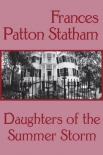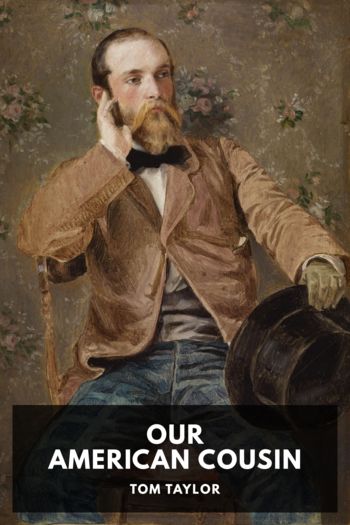Daughters of the Summer Storm by Frances Statham (best sci fi novels of all time .TXT) 📗

- Author: Frances Statham
Book online «Daughters of the Summer Storm by Frances Statham (best sci fi novels of all time .TXT) 📗». Author Frances Statham
He made as if to jerk it off, and in defense, her hand went to her breast as she backed away from him.
"It. . . it was a gift—from the condessa," she answered in a whisper.
Her words brought a tense, incredible look to his face. "Mãe gave you the cross?"
"Y-Yes—before we left Charleston."
The conde closed his eyes, and the pain that filled his face was unmistakable.
Maranta realized then that the condessa had made some terrible breach in giving her the heirloom. Fumbling at the catch, she said, "I will gi-give it back, senhor."
"No, Maranta. If the condessa gave it to you, she. . . meant for you to have it."
He turned and fled from the chapel—leaving the puzzled Maranta alone before the Blessed Virgin.
More unhappy than ever, Maranta wandered around the casa by herself. The doctor came often, and Dona Isobel seemed totally oblivious of the lonely girl because of her nursing duties with the condessa.
And the conde. Ever since their encounter in the chapel, he had looked as if he hated her.
The only time Maranta saw him was in the evenings at dinner, and she felt so self-conscious that she made no attempt to join in the conversation but stared at her plate throughout the meals.
Maranta would like to have seen something of the city, but everyone was too busy for her to suggest it. It was almost like being confined to the ship again, with nothing to relieve her boredom. And she dared not go back into the chapel.
It was mid-morning and Maranta sat on the bench in the secluded garden. With nothing to do, she made up a game, trying to imagine what each place that the condessa and Dona Isobel had told her about, looked like—the spa outside São Paulo where the hot sulphur springs bubbled and where people went to improve their livers—
At the idea of some fat person flushing out his overindulged liver with glass after glass of sulphur water, Maranta laughed aloud and then quickly turned her head to make sure no one had heard her.
She must be more careful—especially with the condessa lying sick in the massive bedroom upstairs.
The frown soon disappeared as Maranta's mind skipped to Ypiranga—where Dom Pedro I had given the cry of freedom, separating Brazil from Portugal, the mother country. There would have to be a fountain in the square, of course, where the people came each day for water. And perhaps there would be a statue of Dom Pedro, himself, astride his horse.
Maranta closed her eyes, attempting to conjure up a suitable statue, but instead of the emperor, her imagination gave her Ruis da Monteiro on his black stallion.
Suddenly a feeling of terror swept over her. If the condessa died, then Maranta would be entirely at the mercy of the conde, with no one to protect her from him.
Her lip quivered and her trembling hands folded in supplication. She immediately thought of Penha—the shrine in the hills where miracles were made. If only she could go there, she would pray for a miracle. But Dona Isobel was too busy, and there was no one else she could ask to take her to the shrine.
Maranta sighed and she hid her troubled face in her hands. The long, black strands of hair hung over fragile shoulders.
"There is something wrong, senhorita?" the voice behind her asked.
A startled Maranta jerked her head up, and she turned in the direction of the voice, to see the man who had evidently been watching her. His eyes were narrowed, and Maranta could see the same antagonism, with no hint of pity or concern for her. It was the same as it had been since that night in the chapel.
"Penha," she whispered, not realizing she had said the word aloud.
She could not move. His glance pinned her against the garden walls as effectively as if she had been one of the captured borboletas, skewered to its velvet casket.
"You wish to view our famous shrine in the hills?" he asked politely.
Maranta quickly nodded. "To. . . pray for the condessa," she said in a distressed voice, barely audible.
Again his eyes narrowed and Maranta dared not move.
"If you wish to go, I will take you, senhorita. And while you are there, I think it would be wise to pray for yourself, as well as for Mãe."
He turned his back to her, but halfway down the path, the conde stopped. Facing in her direction, the dark-haired man ordered, "Be ready in a half-hour."
"Yes, senhor," she replied to his back, for already he had turned and was disappearing toward the stables.
10
She saw the conde reach out and take the basket from Pará, the Indian girl. Maranta hesitated at the edge of the courtyard, but Ruis, seeing her, placed the basket on the mosaic-tiled pavement, and with bold steps, walked toward Maranta.
"Are you looking for the carriage?" he asked, standing before her with his long, black cape swinging over his shoulders.
Maranta nodded.
"A wheel is being repaired," he explained. "Besides, the road is too narrow for the carriage. We will take Diabo instead."
At the sound of his name, the black stallion snorted in impatience. Maranta took a step backward, but the conde's hand reached out to guide her to the horse. "You object?" he asked, gazing down at her with his superior, haughty mien.
"Yes," Maranta answered defiantly. "If. . . if we are to go by horse, then I wish to have one of my own. It is degrading to be treated like a. . . a sack of coffee beans, hoisted in front."
"My apologies," he said, the coldness still evident in his eyes. "I was not aware that you rode."
"We are still strangers, senhor, so there are many things. . ."
". . . that I have yet to learn about you," he finished. "Well, today, it will be how well





Comments (0)